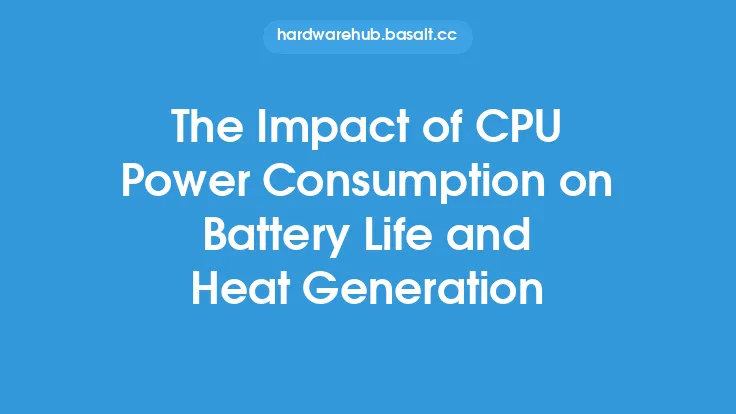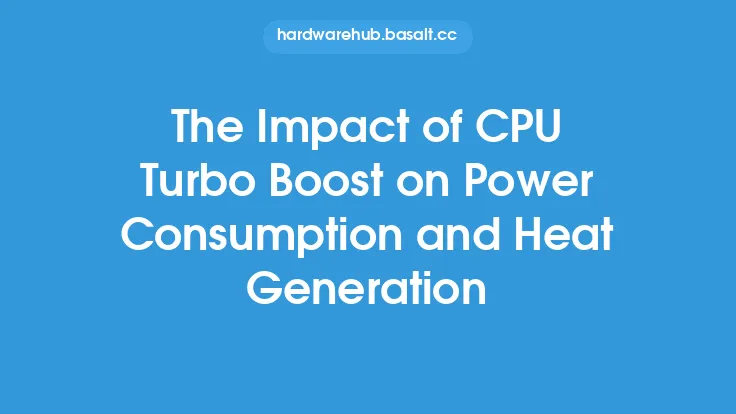The power consumption and heat generation of a system are critical factors that can significantly impact its overall performance, reliability, and lifespan. One of the key components that contribute to these factors is the chipset, which acts as the backbone of the motherboard, connecting various components such as the CPU, memory, and peripherals. In this article, we will delve into the impact of chipsets on system power consumption and heat generation, exploring the various types of chipsets, their design and functionality, and the factors that influence their power consumption and heat generation.
Chipset Types and Power Consumption
There are several types of chipsets available, each with its own unique characteristics, features, and power consumption profiles. The most common types of chipsets include Intel's Z-series, H-series, and B-series, as well as AMD's X-series, B-series, and A-series. These chipsets differ in their features, such as the number of USB ports, SATA ports, and PCIe lanes, which can impact their power consumption. For example, a chipset with more features and ports will generally consume more power than a chipset with fewer features.
The power consumption of a chipset is typically measured in watts (W) and is influenced by several factors, including the chipset's design, manufacturing process, and operating frequency. Chipsets with higher operating frequencies, such as those used in high-performance systems, tend to consume more power than those with lower operating frequencies. Additionally, chipsets with more advanced features, such as USB 3.2 Gen 2 and PCIe 4.0, may also consume more power due to the increased complexity and functionality of these features.
Chipset Design and Functionality
The design and functionality of a chipset can also significantly impact its power consumption and heat generation. Chipsets are typically designed using a combination of digital and analog circuits, which can affect their power consumption and heat generation. For example, chipsets with more digital circuits tend to consume less power than those with more analog circuits, as digital circuits can be designed to operate at lower voltages and frequencies.
The functionality of a chipset can also impact its power consumption and heat generation. For example, a chipset with integrated graphics processing units (GPUs) may consume more power than a chipset without integrated GPUs, as the GPU requires additional power to operate. Similarly, a chipset with advanced features such as overclocking and voltage regulation may also consume more power due to the increased complexity and functionality of these features.
Factors Influencing Chipset Power Consumption
Several factors can influence the power consumption of a chipset, including the operating frequency, voltage, and manufacturing process. The operating frequency of a chipset can significantly impact its power consumption, as higher frequencies require more power to operate. The voltage of a chipset can also impact its power consumption, as lower voltages can reduce power consumption but may also impact performance.
The manufacturing process used to produce a chipset can also impact its power consumption. For example, chipsets produced using a 14nm manufacturing process tend to consume less power than those produced using a 22nm manufacturing process, as the smaller process size allows for more efficient use of power. Additionally, the use of power-saving technologies such as dynamic voltage and frequency scaling (DVFS) can also reduce power consumption by adjusting the operating frequency and voltage of the chipset based on system workload.
Heat Generation and Thermal Management
The heat generation of a chipset is closely related to its power consumption, as the conversion of electrical energy into heat is a natural byproduct of the chipset's operation. The heat generated by a chipset can be significant, particularly in high-performance systems where the chipset is operating at high frequencies and voltages. If not properly managed, this heat can lead to reduced system performance, reliability, and lifespan.
Thermal management is critical to ensuring the reliable operation of a chipset and the overall system. This can be achieved through the use of heat sinks, fans, and other cooling solutions, which can help to dissipate heat away from the chipset and other system components. The design of the motherboard and chipset can also impact thermal management, as the placement of components and the use of thermal interfaces can affect the flow of heat through the system.
Power Consumption and Heat Generation in Modern Chipsets
Modern chipsets have made significant strides in reducing power consumption and heat generation, particularly in the mobile and low-power segments. The use of advanced manufacturing processes, such as 10nm and 7nm, has enabled the production of chipsets with reduced power consumption and heat generation. Additionally, the adoption of power-saving technologies such as DVFS and clock gating has also helped to reduce power consumption and heat generation.
The integration of multiple components, such as the CPU, GPU, and memory controller, into a single system-on-chip (SoC) has also helped to reduce power consumption and heat generation. This integration can reduce the number of components and interfaces required, resulting in lower power consumption and heat generation. Furthermore, the use of advanced materials and designs, such as 3D stacked processors and silicon interposers, has also enabled the production of chipsets with reduced power consumption and heat generation.
Conclusion
In conclusion, the power consumption and heat generation of a chipset can significantly impact the overall performance, reliability, and lifespan of a system. The type of chipset, its design and functionality, and the factors that influence its power consumption and heat generation, such as operating frequency, voltage, and manufacturing process, all play a critical role in determining its power consumption and heat generation. By understanding these factors and using advanced technologies and designs, it is possible to produce chipsets with reduced power consumption and heat generation, enabling the creation of more efficient, reliable, and high-performance systems.





